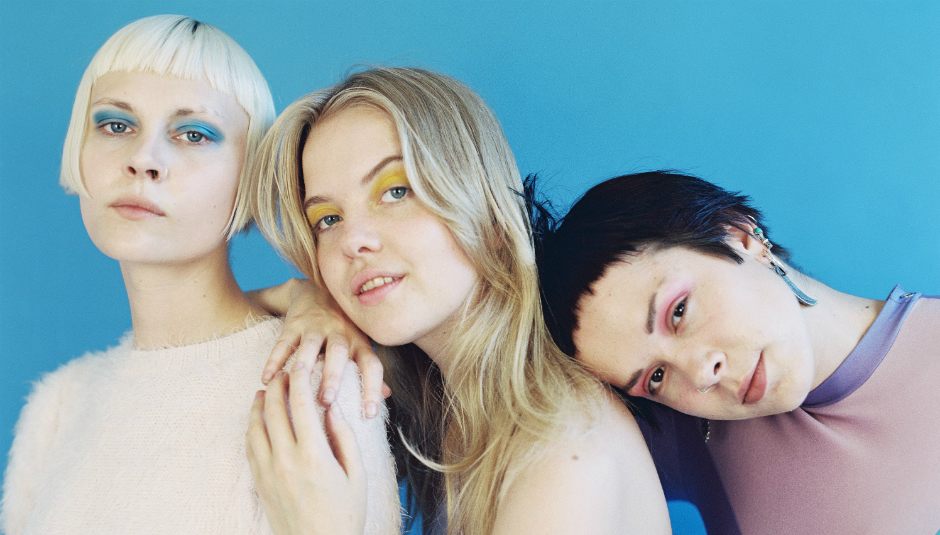I first met Dream Wife in Birmingham back in October and, roughly three hours later, I found myself on their merch table happily selling Bad Bitches t-shirts after the show. Meanwhile, vocalist Rakel Mjöll pinned badges to jackets and danced with excitable converts. It is perhaps the perfect example of the band’s ability to include and win over all who stray within their gravitational pull. Their self-titled LP, which dropped in January, was met with a wave of critical praise and they have since spent the larger chunk of this year winning over big crowds on their first Australian tour. Considering the band began in Brighton as a performance art piece, and never a serious prospect, you could say it’s all going pretty well.
I catch up with Rakel, guitarist Alice Go, and bassist Bella Podpadec over Skype just as they arrive in Belgium. The fact that we’re talking on International Women’s Day might seem planned but, much like everything the band does, the stars have merely aligned. IWD has become an important date in the Dream Wife calendar; last year, their powerful breakthrough single ‘Somebody’ launched them on their current world-beating trajectory. This time around they’ve released a snarling and sequined wrestling-inspired video for vicious album closer ‘F.U.U.’. The visual, with its bratty and unapologetic fierceness, seems an appropriate demonstration of how much has changed for Dream Wife, and indeed the women’s movement, in one short year.
The video for ‘Somebody’, which is filmed in a studio environment, is clean and starkly lit. Its most affecting shots are of the band’s three members posed slightly awkwardly. It throws up just the mildest sense of discomfort. This runs in parallel with the song’s theme of tackling sexual assault in the music industry and the subsequent struggle to reclaim one’s identity after such a trauma. ‘Somebody’ has gone on to become something of an anthem and after being featured by Triple J – Australia’s equivalent to Radio 1 – the band received what Alice describes as a “standing ovation” after playing it live in Sydney. It feels like a natural place to start asking questions.
DiS: Were you surprised at the level of reaction to ‘Somebody’? Did you have any idea that it’d become so significant to so many?
Rakel Mjöll: We’re really thankful and happy to see people singing back “I am not somebody, I am somebody”. It’s amazing that it resonates with so many people.
Alice Go: We make something and then we understand it later. It’s been a year of learning since it came out.
RM: I was quite timid releasing ‘Somebody’ because it is such a personal song. Discussing gender norms, discussing how society treats sexual assault and rape cases. We all agreed it should be the first song to announce that we were releasing an album.
AG: It felt bold for us at the time.
RM: It was also quite scary. It felt very personal. Now there’s more of a conversation being had globally.
How do you think things have changed since this time last year?
Bella Podpadec: It’s been absolutely thrust into mainstream culture. It’s in the Houses of Parliament, it’s in Hollywood, those people from Uber getting fired. It’s everywhere
RM: People are looking into their closets and finding out what’s happening. If we’d have released ‘Somebody’ this year it would have been easier for our own personal state of mind. But doing stuff that’s difficult is the most rewarding and releasing that song has been so rewarding for us. It definitely did get people’s attention. It’s important to do stuff that’s difficult and the outcome is usually way better.
What can we do to make music a safer and more welcoming space for young creative women?
AG: It’s about normalising it as a thing that girls can just do.
RM: It can’t be fetishised.
AG: When we’re talking about what’s changed since last year, it can’t just be a moment. It’s a consistent conversation. It’s brought people together.
RM: You’d have thought that with a year of all of this that festivals would have been a little more on the ball with this in terms of headliners. It really surprised me seeing festival announcements this year.
AG: But it’s about chipping away at it.
RM: You need to be responsible whether you’re a festival booker or a promoter.
BP: It goes to all levels. Even down to men calling out men whether it comes to slut-shaming or shutting down rape jokes. Even if you just see something that happens and you say: “Hey, that’s not cool”. It’ll create happier and safer gig environments.
AG: It’s just the music industry, isn’t it? New things take time to take root in a big and normal way rather than just looking like a trend. Obviously it’s all still such a boys club and it’s deeply embedded which is why we need to keep chip away. There isn’t suddenly going to be a major influx of women tomorrow in the industry which is why we need to make sure that men are calling men out.
BP: It’s just one subsection of our patriarchal society.
AG: Young people now are, what do they call it ... “woke”? The conversations are a lot further on than what we would have when we were 16. It’s just time. These things don’t change overnight.
RM: When we think back to when we were early teens there was such a lack of women fronting rock bands, or a woman guitarist. All I can remember is Le Tigre, Karen O or CSS. What was happening in the 2000s?
AG: Less than ten years prior to that you’ve got riot grrrl. how is it that it could go back so much? So, again, it’s about upholding the conversation. It’s normalising it and upholding it.
RM: There definitely were women fronting rock bands in the 2000s but we didn’t hear about them. They didn’t have access. When you allow yourself to feel safe in a writing space, there’s trust, there’s humour, and that’s where you can actually create songs. Where you can write songs and not worry about whether you’re not good enough. There’s a trust between us that makes everything so much easier
AG: You don’t have to think about yourself and whether you’re doing things wrong. It just comes easily.
So much of the Dream Wife live show is based around inclusivity and a sense of togetherness. How will you maintain that as the venues and crowds get larger?
AG: Thinking about when we first even thought about this as a project, it had an attitude of “it goes its own way, it grows its own way” and we don’t question that. We’re going on instinct and that’s not changed since the start. It’ll grow as the venues grow.
RM: At our first show, at uni, we made a human pyramid. Me and Bella were on our knees, headbanging in circles, Alice would then jump up and do a crazy solo on our backs and that would be the highlight of the show. As the show progressed, and we couldn’t do that anymore, we realised actually that we can always do something else. It will always have an element of keeping it fun and interactive.
AG: It’s about embracing each other and enjoying the show through that.
RM: You’re there to be entertained even if it tackles issues that are difficult or are questioning society. I think you’re supposed to have fun – positive anger, ideas or seeing things differently or just having a great time with your friends. As long as you walk away feeling something inside you.
Where does that “instinct” come from?
BP: Chemistry and spending a shitload of time together. Sometimes slightly dangerous, sometimes slightly awkward shows.
RM: It’s healthy for you to discover your own confidence. If the music wasn’t something that we liked, it wouldn’t be confident. We’ve made it wholeheartedly. The more live shows we do, the better the songs become. It comes through time and all these things that happen. Interesting things happen and we incorporate it into the next set. All this confidence is a mixture of chemistry and just going out there and doing it again, again and again. If we had just, like, written stuff on a computer and played five shows I don’t think we’d have it.
AG: There’s an element of trust. We’re three friends doing this crazy thing together. We’re learning together as we go. It’s a confidence in yourself and a confidence as a unit. We’ve gone through a lot of things, we’re very good together and we’re a power trio. We do things that are scary sometimes but when we do it together, it isn’t scary. It becomes fun.
RM: There’s no room for ego in bands. I’m really happy that the attention we’re getting is happening to this band because now I know what I want to say. You’re building on top of positives. Not on top of someone’s ego.
AG: There’s a conversation together. We could write a thesis about this. The way we operate is highly instinctive. It’s got this spontaneity to it.
I really like how you worked with Meg Lavender to celebrate your female audience members on tour - Bad Bitches - and your regular work with Aiden Zamir on your music videos. Which of your collaborators do you value the most?
AG: Everyone we’ve ever worked with.
BP: Dream Wife is more than just the three of us. It’s that art school thing. It’s combining your ideas and your skillset into things that are better than what you could achieve without those people who are around you.
RM: We really trust in our collaborators. They understand what we’re thinking and they respect that. We also understand their creative process. We don’t have to talk. We have these conversations and we respect each other’s art forms too much to fuck it up.
AG: With Meg or Aiden, for example, they’re people that we’ve worked with more than just the once and they’re ongoing conversations. It’s letting someone into your world and, again, it’s trust. It forces you to come together and you create something out of this world and it’s beyond what you could achieve alone.
BP: It’s being artists as well as musicians. It’s a dialogue that expands your ideas and horizons.
RM: When we started Dream Wife, we weren’t really a part of the music scene in Brighton. We hardly knew any bands. The people around us were artists and people in the drag scene. Everyone in that scene was discovering themselves so we were much more a part of the drag scene than the music scene. It was only when we came back to Brighton after being away that people were like: “Oh, you’re part of the Brighton music scene!”
Having grown from those DIY and collaborative art school principles, was there a certain pressure to get the album right?
RM: It was the first time we went to a proper studio.
BP: It took longer than we were expecting as it was important to find the right tone for it.
AG: We wanted it to be right.
And presumably you’ve had to overcome challenges along the way. Is it hard not to over-analyse as things get more serious? Do you start thinking about changing your process?
AG: How do you keep that energy going when you’re over-analysing and you don’t want to stifle it? Ultimately, when we talk about a chemistry, it’s talking about us as three people who are doers. There’s an energy. We get on with things and we trust that energy.
RM: When you’ve experienced a challenging show, oh my god, you feel so great after a good one.
BP: If you’re just in a position where you’re, like: “Whatever we do, we’re going to challenge ourselves and we’re going to see what we can make”. It’s that attitude and it’s beyond taste. It’s hard to define why songs come out a certain way.
RM: I’ve written so many ballads that have been turned into rock songs. I’ll take something sweet and soft to Alice and Bella and they make it a rock song and that’s great. You can take something that’s funny and stupid and then play it and suddenly it becomes a really great Dream Wife song.
AG: It’s about not being afraid to just try something. I’ve definitely been in bands where you feel so timid. “Should I do it this way or should I hold back?” We don’t hold back in this band and we push ourselves and each other.
RM: Any band that you’re in when you’re younger, it’s all about holding back. We’re not holding back at all. We also never put any expectations on Dream Wife. It was always supposed to be a funny project. We have never taken this seriously until, like, now. When people genuinely believe in what it is that you’re doing.
Just before we run out of time I remark on how I find it interesting that I feel I’m too old and too bitter to have enjoyed the youthful exuberance of the album as much as I have. Rakel cuts across me immediately to tell me that I shouldn’t shut it out. Ever the cheerleader of positivity, she advises me to “let music stay with you” and we say our goodbyes.
Dream Wife is out now via Lucky Number Music. For more information on Dream Wife, including forthcoming tour dates, please visit their official website.
Photo Credit: Francesca Allen






















